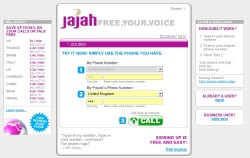Interview: VoIP firm Jajah on T-Mobile investment and ad-funded VoIP prospects
 Voice-over-IP firm Jajah is experimenting with advertising-funded models that could mean free telephony in the future. Although most VoIP services offer free calls now, they’re usually only to other users of that service, with calls to landlines or mobiles being charged – albeit at a lower rate than non-VoIP telephony.
Voice-over-IP firm Jajah is experimenting with advertising-funded models that could mean free telephony in the future. Although most VoIP services offer free calls now, they’re usually only to other users of that service, with calls to landlines or mobiles being charged – albeit at a lower rate than non-VoIP telephony.
However, Jajah co-founder Daniel Mattes says that advertising could lead to totally free calls. “Currently, 80% of our revenue comes from telephony, with 20% coming from additional features like conference calls or video calls,” he says.
“We are testing advertising-supported models, and we think that at the end of the day, it will be possible to offer really free telephony based on a sponsorship model. It’s not far away.”
The advertising would take the form of audio ads at the start of your call, as well as traditional online ads on the Jajah website, where users initiate their calls. “It will be a choice of the user,” says Mattes. “They will choose whether to pay and have no advertising, or have a sponsor. It must be relevant though, and not be intrusive.”
This is just one of the innovative aspects about Jajah. Another is its focus on ease of use: getting users to enter their telephone number on its website, and the number of the person they want to call. Jajah’s system then calls them, patches in the other person, and thus provides internet calls through standard telephone lines. Your mum could use it, in other words. They don’t use that as the tagline as far as I’m aware.
 “It started because our girlfriends didn’t want to use Skype, even when we installed it on our home machines,” says Mattes, referring to himself and co-founder Roman Scharf. “They didn’t want to be tied to a computer or a headset. Beyond that, we also realised that existing services were too complicated for this mass market. So we tried to make VoIP telephony as simple as searching Google.”
“It started because our girlfriends didn’t want to use Skype, even when we installed it on our home machines,” says Mattes, referring to himself and co-founder Roman Scharf. “They didn’t want to be tied to a computer or a headset. Beyond that, we also realised that existing services were too complicated for this mass market. So we tried to make VoIP telephony as simple as searching Google.”
Mattes says Jajah now has nearly three million users in just over a year’s operations, which is impressive. The big news about Jajah this week, however, isn’t to do with the way it works. It’s to do with its latest round of investment, which includes funding from T-Online Venture Fund, which is part of Deutsche Telekom. Mattes says it’s the first time a big telecoms firm has invested in a VoIP company.
“The traditional telecoms firms see Wi-Fi players eating their revenue, and they can either accept it, fight against it, or become part of it,” he adds. “Deutsche Telekom is an example of the industry giants stepping into the VoIP market, which will really move things along.”
Deutsche Telekom joins an earlier strategic investment from Intel, and Mattes says the two firms are looking for more than just a return on their investments.
“Intel are going to embed Jajah inside their chipsets, in the same way they did with Wi-Fi, and made it a mainstream market,” he says. “And Deutsche Telekom will follow a similar policy, offering Jajah as part of their services.”
Meanwhile, Jajah is focusing on product development, including ensuring its website works on all manner of devices from mobile (it has a slimmed down mobile site) to PSPs and BlackBerrys. Richer features will be introduced too, in the same way that Jajah introduced a conference call function, where users simply enter five numbers into the website interface, letting Jajah do the rest.
“You click to call, and all the phones will ring,” he says. “All the features we embed will be embedded in a way that is extremely Jajah-like.”

